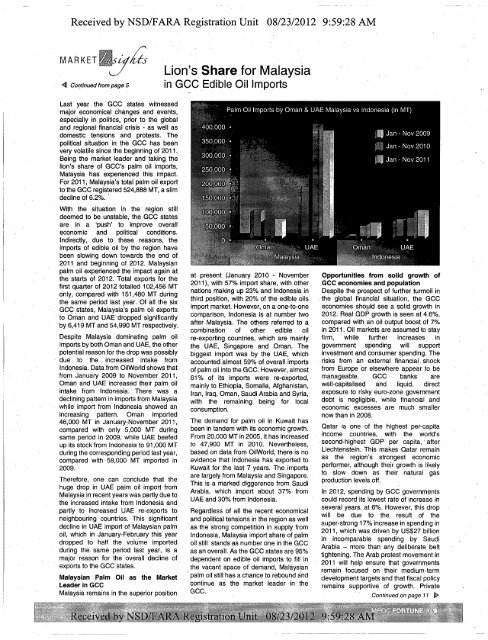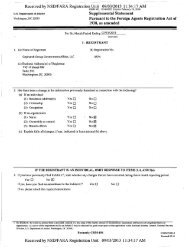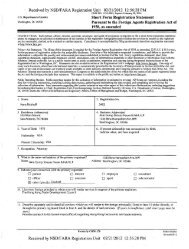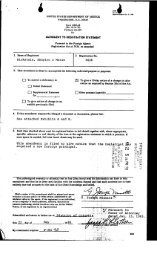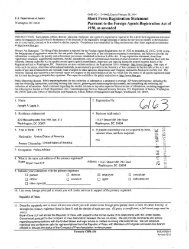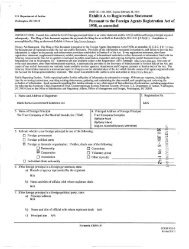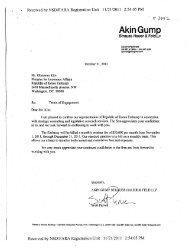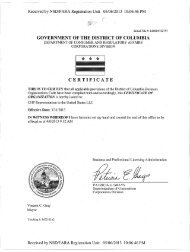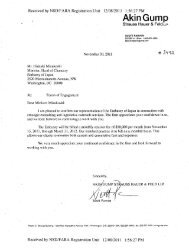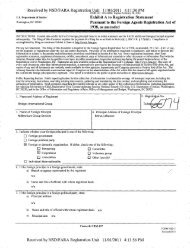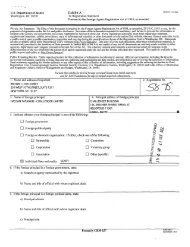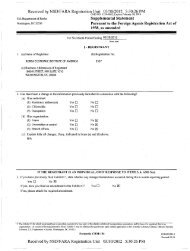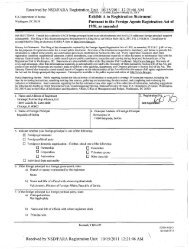Supplemental Statement - FARA
Supplemental Statement - FARA
Supplemental Statement - FARA
You also want an ePaper? Increase the reach of your titles
YUMPU automatically turns print PDFs into web optimized ePapers that Google loves.
Received by NSD/<strong>FARA</strong> Registration Unit 08/23/2012 9:59:28 AM<br />
MARKET|§|^/to<br />
_y Lion's Share for Malaysia<br />
•4 Continued from page 5 ill GCC Edible Oil ImpOllS<br />
Last year the GCC states witnessed<br />
major economical changes and events,<br />
especially in politics, prior to the global<br />
and regional financial crisis - as well as<br />
domestic tensions and protests. The<br />
political situation in the GCC has been<br />
very volatile since the beginning of 2011.<br />
Being the market leader and taking the<br />
lion's share of GCC's palm oil imports,<br />
Malaysia has experienced this impact.<br />
For 2011, Malaysia's total palm oil export<br />
to the GCC registered 524,888 MT, a slim<br />
decline of 6.2%. *<br />
With the situation in the region still<br />
deemed to be unstable, the GCC states<br />
are in a 'push' to improve overall<br />
economic and political conditions.<br />
Indirectly, due to these reasons, the<br />
imports of edible oil by the region have<br />
been slowing down towards the end of<br />
2011 and beginning of 2012. Malaysian<br />
palm oil experienced the impact again at<br />
the starts of 2012. Total exports for the<br />
first quarter of 2012 totalled 102,456 MT<br />
only, compared with 151,480 MT during<br />
the same period last year. Of all the six<br />
GCC states, Malaysia's palm oil exports<br />
to Oman and UAE dropped significantly<br />
by 6,419 MT and 54,990 MT respectively.<br />
Despite Malaysia dominating palm oil<br />
imports by both Oman and UAE, the other<br />
potential reason for the drop was possibly<br />
due to the increased intake from<br />
Indonesia. Data from OilWorld shows that<br />
from January 2009 to November 2011,<br />
Oman and UAE increased their palm oil<br />
intake from Indonesia. There was a<br />
declining pattern in imports from Malaysia<br />
while import from Indonesia showed an<br />
increasing pattern. Oman imported<br />
46,000 MT in January^November 2011,<br />
compared with only 5,000 MT during<br />
same period in 2009, while UAE beefed<br />
up its stock from Indonesia to 91,000 MT<br />
during the corresponding period last year,<br />
compared with 58,000 MT imported in<br />
2009.<br />
Therefore, one can conclude that the<br />
huge drop in UAE palm oil import from<br />
Malaysia in recent years was partly due to<br />
the increased intake from Indonesia and<br />
partly to increased UAE re-exports to<br />
neighbouring countries. This significant<br />
decline in UAE import of Malaysian palm<br />
oil, which in January-February this year<br />
dropped to half the volume imported<br />
during the same period last year, is a<br />
major reason for the overall decline of<br />
exports to the GCC states.<br />
Malaysian Palm Oil as the Market<br />
Leader in GCC<br />
Malaysia remains in the superior position<br />
. t<br />
•:•»:•;•<br />
«»wr»s<br />
mmm<br />
MM 1


